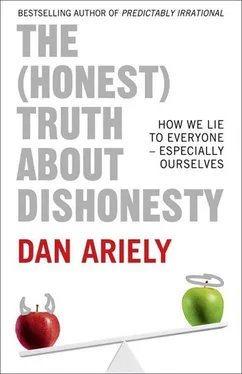Ariely, Dan - The (Honest) Truth About Dishonesty - How We Lie to Everyone – Especially Ourselves
Здесь есть возможность читать онлайн «Ariely, Dan - The (Honest) Truth About Dishonesty - How We Lie to Everyone – Especially Ourselves» весь текст электронной книги совершенно бесплатно (целиком полную версию без сокращений). В некоторых случаях можно слушать аудио, скачать через торрент в формате fb2 и присутствует краткое содержание. Жанр: Старинная литература, на английском языке. Описание произведения, (предисловие) а так же отзывы посетителей доступны на портале библиотеки ЛибКат.
- Название:The (Honest) Truth About Dishonesty: How We Lie to Everyone – Especially Ourselves
- Автор:
- Жанр:
- Год:неизвестен
- ISBN:нет данных
- Рейтинг книги:4 / 5. Голосов: 1
-
Избранное:Добавить в избранное
- Отзывы:
-
Ваша оценка:
- 80
- 1
- 2
- 3
- 4
- 5
The (Honest) Truth About Dishonesty: How We Lie to Everyone – Especially Ourselves: краткое содержание, описание и аннотация
Предлагаем к чтению аннотацию, описание, краткое содержание или предисловие (зависит от того, что написал сам автор книги «The (Honest) Truth About Dishonesty: How We Lie to Everyone – Especially Ourselves»). Если вы не нашли необходимую информацию о книге — напишите в комментариях, мы постараемся отыскать её.
The (Honest) Truth About Dishonesty: How We Lie to Everyone – Especially Ourselves — читать онлайн бесплатно полную книгу (весь текст) целиком
Ниже представлен текст книги, разбитый по страницам. Система сохранения места последней прочитанной страницы, позволяет с удобством читать онлайн бесплатно книгу «The (Honest) Truth About Dishonesty: How We Lie to Everyone – Especially Ourselves», без необходимости каждый раз заново искать на чём Вы остановились. Поставьте закладку, и сможете в любой момент перейти на страницу, на которой закончили чтение.
Интервал:
Закладка:
Before we take a tour of some experiments examining the impact of collaboration on cheating, let’s take a step back and think about possible positive and negative influences of teams and collaboration on our tendency to be dishonest.
Altruistic Cheating: Possible Costs of Collaboration
Work environments are socially complex, with multiple forces at play. Some of those forces might make it easy for group-based processes to turn collaborations into cheating opportunities in which individuals cheat to a higher degree because they realize that their actions can benefit people they like and care about.
Think about Jennifer again. Suppose she was a loyal person and liked to think of herself that way. Suppose further that she really liked her supervisor and team members and sincerely wanted to help them. Based on such considerations, she might have decided to fulfill her boss’s request or even take her report a step further—not because of any selfish reasons but out of concern for her boss’s well-being and deep regard for her team members. In her mind, “bad” numbers might get her boss and team members to fall out of favor with the client and the accounting company—meaning that Jennifer’s concern for her team might lead her to increase the magnitude of her misbehavior.
Underlying this impulse is what social scientists call social utility. This term is used to describe the irrational but very human and wonderfully empathetic part of us that causes us to care about others and take action to help them out when we can—even at a cost to ourselves. Of course, we are all motivated to act in our own self-interest to some degree, but we also have a desire to act in ways that benefit those around us, particularly those we care about. Such altruistic feelings motivate us to help a stranger who is stuck with a flat tire, return a wallet we’ve found in the street, volunteer at a homeless shelter, help a friend in need, and so on.
This tendency to care about others can also make it possible to be more dishonest in situations where acting unethically will benefit others. From this perspective, we can think about cheating when others are involved as altruistic—where, like Robin Hood, we cheat because we are good people who care about the welfare of those around us.
Watch Out: Possible Benefits of Collaboration
In Plato’s “Myth of the King of Gyges,” a shepherd named Gyges finds a ring that makes him invisible. With this new-found power, he decides to go on a crime spree. So he travels to the king’s court, seduces the queen, and conspires with her to kill the king and takes control of the kingdom. In telling the story, Plato wonders whether there is anyone alive who could resist taking advantage of the power of invisibility. The question, then, is whether the only force that keeps us from carrying out misdeeds is the fear of being seen by others (J. R. R. Tolkien elaborated on this theme a couple millennia later in The Lord of the Rings ). To me, Plato’s myth offers a nice illustration of the notion that group settings can inhibit our propensity to cheat. When we work within a team, other team members can act informally as monitors, and, knowing that we are being watched, we may be less inclined to act dishonorably.
A CLEVER EXPERIMENTby Melissa Bateson, Daniel Nettle, and Gilbert Roberts (all from the University of Newcastle) illustrated the idea that the mere feeling of being watched can inhibit bad behavior. This experiment took place in the kitchen of the psychology department at the University of Newcastle where tea, coffee, and milk were available for the professors and staff. Over the tea-making area hung a sign saying that beverage drinkers should contribute some cash to the honesty box located nearby. For ten weeks the sign was decorated with images, but the type of image alternated every week. On five of the weeks the sign was decorated with images of flowers, and on the other five weeks the sign was decorated with images of eyes that stared directly at the beverage drinkers. At the end of every week, the researchers counted the money in the honesty box. What did they find? There was some money in the box at the end of the weeks when the image of flowers was hung, but when the glaring eyes were “watching,” the box contained almost three times more money.
As is the case with many findings in behavioral economics, this experiment produced a mix of good and bad news. On the negative side, it showed that even members of the psychology department—who you would think would know better—tried to sneak off without paying their share for a common good. On the positive side, it showed that the mere suggestion that they were being watched made them behave more honestly. It also shows that a full-blown Orwellian “Big Brother is watching” approach is not necessary and that much more subtle suggestions of being watched can be effective in increasing honesty. Who knows? Perhaps a warning sign, complete with watchful eyes, on Jennifer’s boss’s wall might have made a difference in his behavior.
IN PONDERING JENNIFER’Ssituation, Francesca Gino, Shahar Ayal, and I began to wonder how dishonesty operates in collaborative environments. Does monitoring help to reduce cheating? Do social connections in groups increase both altruism and dishonesty? And if both of these forces exert their influence in opposite directions, which of the two is more powerful? In order to shed light on this question, we turned once again to our favorite matrix experiment. We included the basic control condition (in which cheating was not possible), the shredder condition (in which cheating was possible), and we added a new condition that introduced a collaborative element to the shredder condition.
As our first step in exploring the effects of groups, we didn’t want the collaborators to have an opportunity to discuss their strategy or to become friends, so we came up with a collaboration condition that included no familiarity or connection between the two team members. We called it the distant-group condition. Let’s say you are one of the participants in the distant-group condition. As in the regular shredder condition, you sit at a desk and use a number 2 pencil to work on the matrices for five minutes. When the time is up, you walk to the shredder and destroy your test sheet.
Up to that point, the procedure is the same as in the basic shredder condition, but now we introduce the collaborative element. The experimenter tells you that you are part of a two-person team and that each of you will be paid half of the group’s total earnings. The experimenter points out that your collection slip is either blue or green and has a number printed in the top-right corner. The experimenter asks you to walk around the room and find the person whose collection slip is different in color but with the same number in the top-right corner. When you find your partner, you sit down together, and each of you writes the number of matrices you correctly solved on your collection slip. Next, you write the other person’s score on your collection slip. And finally, you combine the numbers for a total performance measure. Once that’s done, you walk over to the experimenter together and hand him both collection slips. Since your worksheets have been shredded, the experimenter has no way to check the validity of your reported earnings. So he takes your word for it, pays you accordingly, and you split the takings.
Do you think people in this situation would cheat more than they did in the individual shredder condition? Here’s what we found: when participants learned that both they and someone else would benefit from their dishonesty if they exaggerated their scores more, they ended up engaging in even higher levels of cheating, claiming to have solved three more matrices than when they were cheating just for themselves. This result suggests that we humans have a weakness for altruistic cheating, even if we barely know the person who might benefit from our misbehavior. Sadly, it seems that even altruism can have a dark side.
Читать дальшеИнтервал:
Закладка:
Похожие книги на «The (Honest) Truth About Dishonesty: How We Lie to Everyone – Especially Ourselves»
Представляем Вашему вниманию похожие книги на «The (Honest) Truth About Dishonesty: How We Lie to Everyone – Especially Ourselves» списком для выбора. Мы отобрали схожую по названию и смыслу литературу в надежде предоставить читателям больше вариантов отыскать новые, интересные, ещё непрочитанные произведения.
Обсуждение, отзывы о книге «The (Honest) Truth About Dishonesty: How We Lie to Everyone – Especially Ourselves» и просто собственные мнения читателей. Оставьте ваши комментарии, напишите, что Вы думаете о произведении, его смысле или главных героях. Укажите что конкретно понравилось, а что нет, и почему Вы так считаете.












